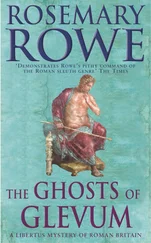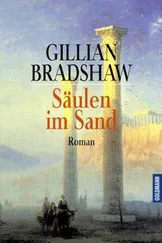Gillian Bradshaw - Island of Ghosts
Здесь есть возможность читать онлайн «Gillian Bradshaw - Island of Ghosts» весь текст электронной книги совершенно бесплатно (целиком полную версию без сокращений). В некоторых случаях можно слушать аудио, скачать через торрент в формате fb2 и присутствует краткое содержание. Жанр: Исторические приключения, на английском языке. Описание произведения, (предисловие) а так же отзывы посетителей доступны на портале библиотеки ЛибКат.
- Название:Island of Ghosts
- Автор:
- Жанр:
- Год:неизвестен
- ISBN:нет данных
- Рейтинг книги:3 / 5. Голосов: 1
-
Избранное:Добавить в избранное
- Отзывы:
-
Ваша оценка:
- 60
- 1
- 2
- 3
- 4
- 5
Island of Ghosts: краткое содержание, описание и аннотация
Предлагаем к чтению аннотацию, описание, краткое содержание или предисловие (зависит от того, что написал сам автор книги «Island of Ghosts»). Если вы не нашли необходимую информацию о книге — напишите в комментариях, мы постараемся отыскать её.
Island of Ghosts — читать онлайн бесплатно полную книгу (весь текст) целиком
Ниже представлен текст книги, разбитый по страницам. Система сохранения места последней прочитанной страницы, позволяет с удобством читать онлайн бесплатно книгу «Island of Ghosts», без необходимости каждый раз заново искать на чём Вы остановились. Поставьте закладку, и сможете в любой момент перейти на страницу, на которой закончили чтение.
Интервал:
Закладка:
“I wished to match his own daring,” I answered, after a silence. She looked at me quizzically; the others stared with incomprehension and disgust, and I went on, reluctantly, “I had a hundred armored horsemen and three hundred mounted archers, and we had crossed the Danube to raid. We were driving off the flocks and the cattle from a settlement when a centurion came up with just one century and ten legionary dispatch riders, ninety men in all. I do not know whether he had thought we were fewer, or whether he had expected reinforcements to join him. My armored troops alone could have dealt with twice his numbers easily. But he shouted at us to return the beasts to their owners and leave Roman land at once, and I was astonished at his courage. I thought I would have no glory from the contest unless I could match such bravery. So I offered to fight him man to man, and made my men swear that if he killed me, they would not harm him, but leave, as he’d ordered. Then I got off my horse, put my weapons and armor aside, and came to fight him with a lasso and a dagger. He had his armor, javelin, and sword; he told me I was mad, and I told him he had no right to say so, and we both laughed. I spared his men when I’d killed him. I would not have taken his head as a trophy if I had not admired him.”
I remembered riding back with the centurion’s head hanging from my saddle, absolutely drunk with glory, and my men laughing and shouting and singing. What an exploit! Worthy of songs, worthy of a hero! I had never been so proud of anything in my life. When I came home, to my own wagon, my men shouted out the story to my wife, Tirgatao, waving the skull-now scalped and cut in half and scraped clean to prepare it for use as a cup. Tirgatao took it and stared at it in amazement, then put it down and slapped me so hard I nearly fell over. Then she grabbed my shoulders and shook me. “Do you want to make me a widow?” she asked. “Don’t you want to live to see your son?”-she was seven months pregnant at the time. “I want my son to be proud of his father,” I told her, putting my arms around her. “Proud!” she shouted, putting hers around me and kissing me. “You lunatic! Oh, my dragon, my eagle, my golden hero! Don’t you ever do that again!” She was crying with pride and anger, and under both of them was love. And now I was one of the dead, and the story I had gloried in was told by the Romans to disgrace me.
Though they thought the details less disgraceful than they’d expected. They’d obviously taken Facilis’ reference to rope and a dagger as some kind of Sarmatian torture, and now they were looking at me with puzzlement, rather than disgust.
“You don’t want your people to cause us trouble,” said Bodica. It wasn’t a question. The blue eyes studied me as they had before, dispassionately, assessingly.
“I do not want my men to get into trouble,” I agreed. “I want them to live. Enough have died this summer already.”
“Why were you buying them… apples?” Again the smile, sweet and unsettling. “It was apples you were buying in the market, wasn’t it, Lord Ariantes?”
That she asked that question then, after making sure I didn’t want trouble, made me think that she’d already guessed why I wanted the apples. I looked at Priscus: he was puzzled and irritated. He had not guessed. “When I go back,” I said slowly, wondering why she was trying to help me, “if I tell them that there is no trick, and that there really is an island of Britain here, they will believe me, but they will still be afraid. If I give them something from the island-if I give them apples, which they can see, and smell, and taste, and eat, and feed to their horses-then they will be confident. It will be much easier for them then.”
Bodica looked at her husband. “Tiberius,” she said softly, “he’d manage them much better than Lucius or Gaius or Marcus would.”
“I suppose so,” Priscus grunted, releasing whatever he’d intended to do with me, like a dog backing reluctantly away from a bone. “Very well, we won’t tinker with the command of the Sarmatian troops. We won’t make them proper auxiliary alae yet: they can be numeri, under their own native officers. You and your two friends, Ariantes, can command, and you three tribunes can call yourselves liaison officers and make sure the barbarians follow orders. We can work out the arrangements now.” He clapped his hands for the slaves to bring in the first course. “If there’s trouble, though,” he said, glaring at me over the boiled eggs in garlic, “and if you’re responsible, I’ll have you flogged to death. Now I’ll tell you exactly what’s required of you.”
When the wretched party ended and they stopped lecturing and interrogating and allowed me to crawl off to the bedroom, I stood for a minute looking out the window. My head was aching with anxieties and I was dizzy with the newness of it all. I remembered, with a stab of terror, how Natalis had wanted to deal with us. Find a reasonable Sarmatian commander, use him to divide and rule. Other Sarmatians had been reasonable and had ended up betraying their own kind. Was that what Aurelia Bodica wanted? And I realized what it was that I found so unsettling in her: that assessing stare, like a craftsman looking for a tool, and the craftsman’s smile at finding one. I was afraid-afraid of the island, of the Roman army, of the honor and passions of my own people, of the legate, his wife, and myself. But I felt, strangely, more awake than I had for a long time. I could see only the courtyard below, barred with lamplight, and hear only the sounds of the slaves cleaning the dining room and the other guests going to bed. But I could smell the sea. Gatalas’ fears had been all wrong: I was not going to come back a ghost. By passing the salt water, I was forced back into the world, painfully born into another life.
The next afternoon found me back in Bononia.
III
The apples helped. I tossed them out as soon as the bireme docked in Bononia, the men passed them from hand to hand, examining them and tasting them, and when I rode back into the center of our camp and made a speech about Britain, they were ready to be convinced. Nonetheless, it was no easy job to tear ourselves loose from the land and set sail on the unfathomable water. I asked the procurator Natalis to allow us a day for preparation and prayer before embarking.
“Of course, Lord Ariantes,” he said, smiling benevolently. “Roman soldiers often want to purify themselves before a voyage, too. I’ve even seen Italians afraid to cross the ocean, and we often have trouble with the Pannonians and the easterners. Your people aren’t the only ones who think the world ends at the Channel. Do you need any cattle for the sacrifice?”
“We use horses,” I told him, and he offered to provide some.
Facilis apparently argued with him after I left, telling him that a delay would only give us more opportunity to mutiny, but, fortunately, Natalis didn’t listen to him. He was eager to help us. In Dubris I’d learned that he usually resided on the British side of the Channel, and had only based himself in Bononia to supervise us. He saw to it that we had proper food, access to water for washing and enough fuel, and medicines for sick men and sore-footed horses-all the things we’d missed on the journey. I began to realize how much we had endured before because Facilis was the only one responsible for us. Of course, perhaps a part of it was that I was willing to go and ask for what we needed, instead of drifting blindly in the nightmare-or enduring proudly and dreaming of revenge, like Arshak and Gatalas.
So we were able to commit ourselves to the gods before embarking. We washed our clothing, groomed our horses, and set up some steam tents to clean ourselves properly. Then we assembled at noon to sacrifice to Marha and read the omens for the voyage. The sacrifice, of three horses, went well, and the omens were, on the whole, encouraging. Each of our companies had its own diviner, who knew how to read the patterns made by the willow rods, marked black with charcoal and white with chalk, that we use to discover the will of the gods and to foretell the future. Gatalas’ diviner foretold life and good fortune for the dragon across the sea, but warned of danger from lies and from fire; he promised the company glory in war-which they received with a loud yell of pleasure-but warned the commander to beware of deceit, and foretold that he would die in battle. Arshak’s diviner was less skillful. His company was indeed promised good fortune, but also disaster. The message for Arshak himself was equally confused: danger in lies, danger in darkness, life and death appearing equally balanced. Arshak received this prophecy with a smile. “I will die when it is fated,” he said, “but I trust I will not die unavenged.”
Читать дальшеИнтервал:
Закладка:
Похожие книги на «Island of Ghosts»
Представляем Вашему вниманию похожие книги на «Island of Ghosts» списком для выбора. Мы отобрали схожую по названию и смыслу литературу в надежде предоставить читателям больше вариантов отыскать новые, интересные, ещё непрочитанные произведения.
Обсуждение, отзывы о книге «Island of Ghosts» и просто собственные мнения читателей. Оставьте ваши комментарии, напишите, что Вы думаете о произведении, его смысле или главных героях. Укажите что конкретно понравилось, а что нет, и почему Вы так считаете.












